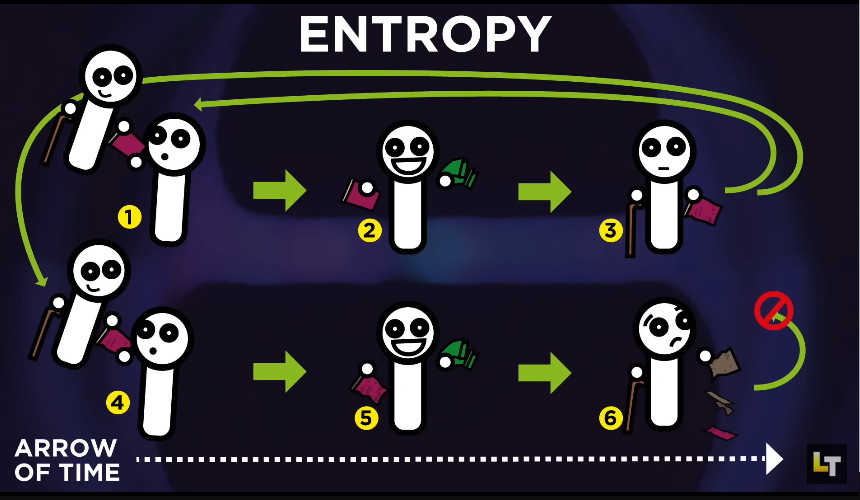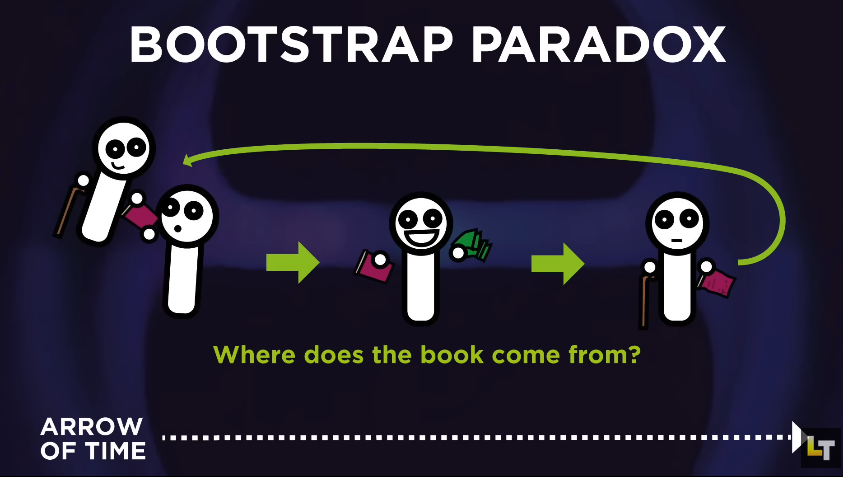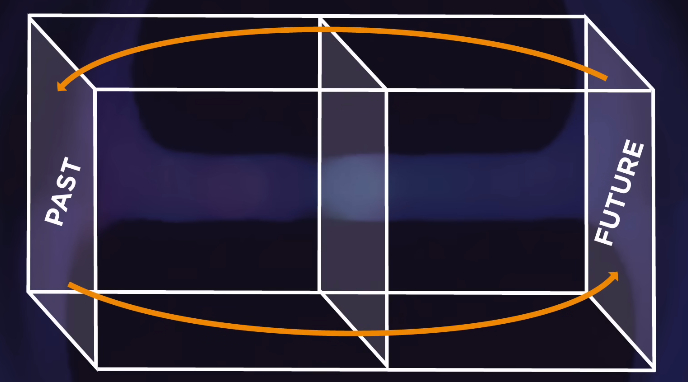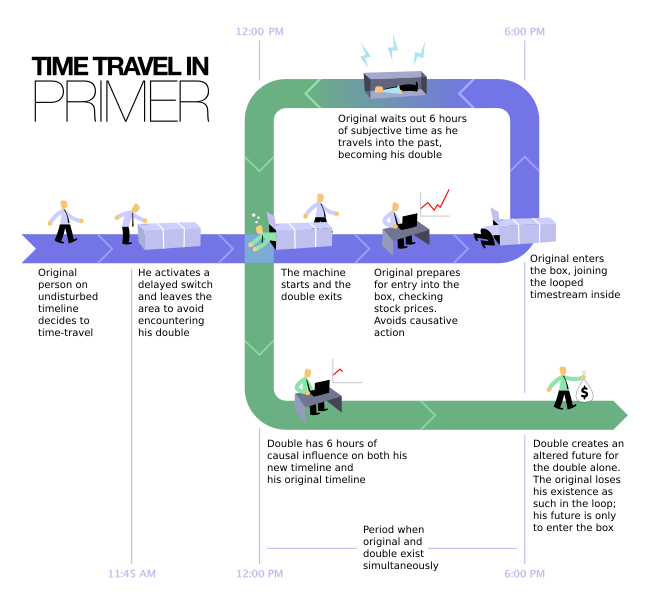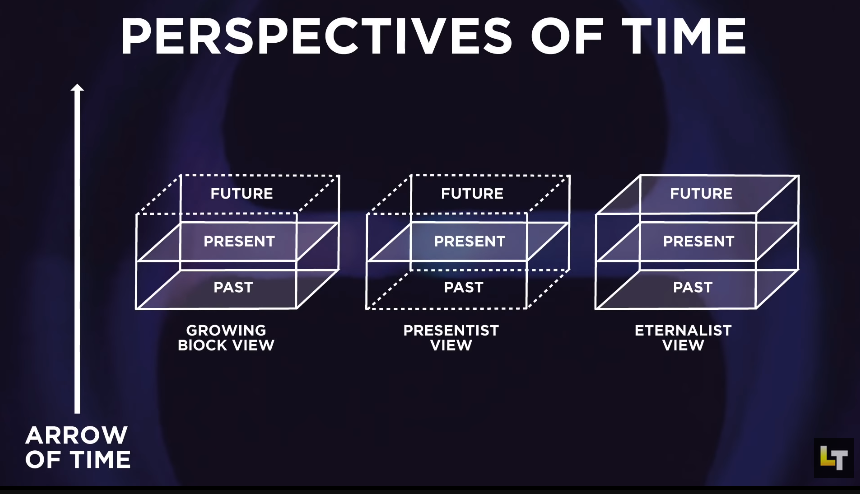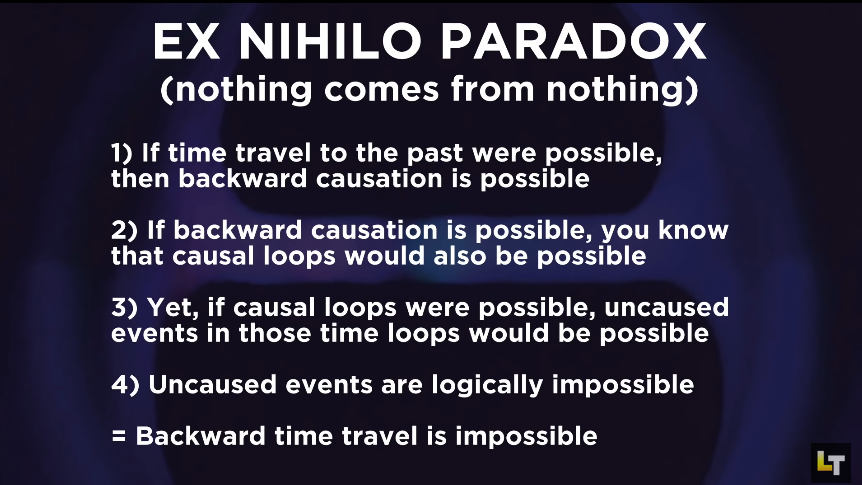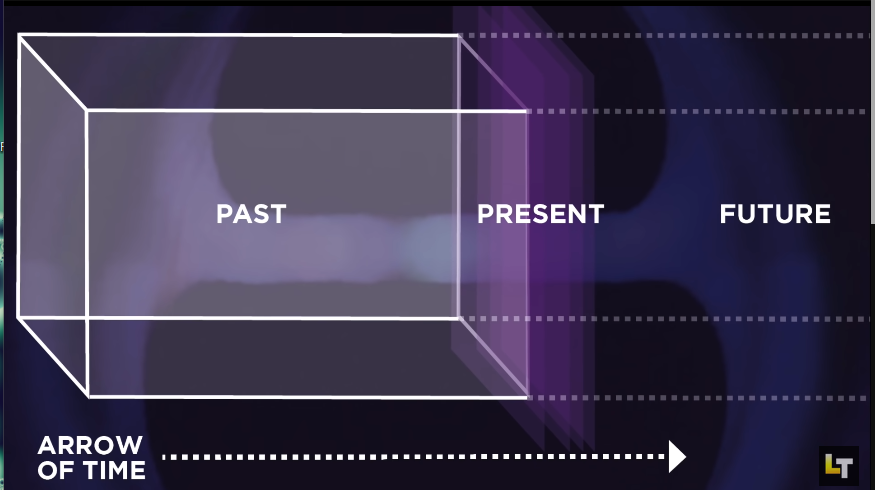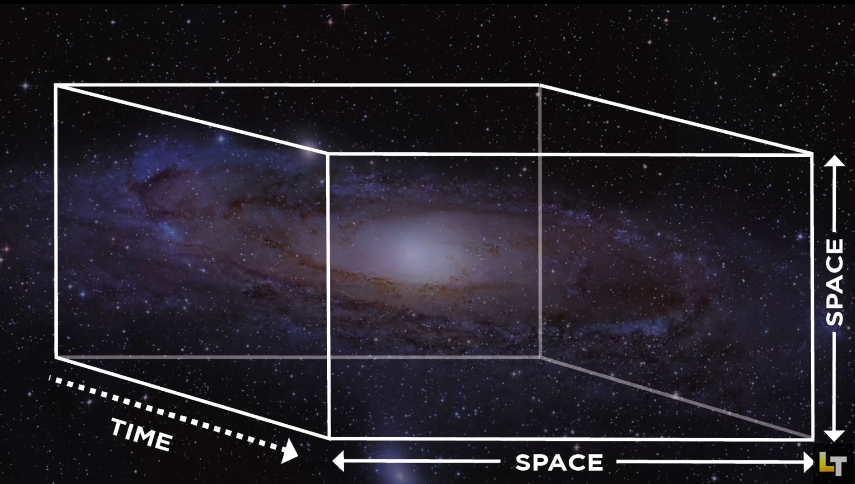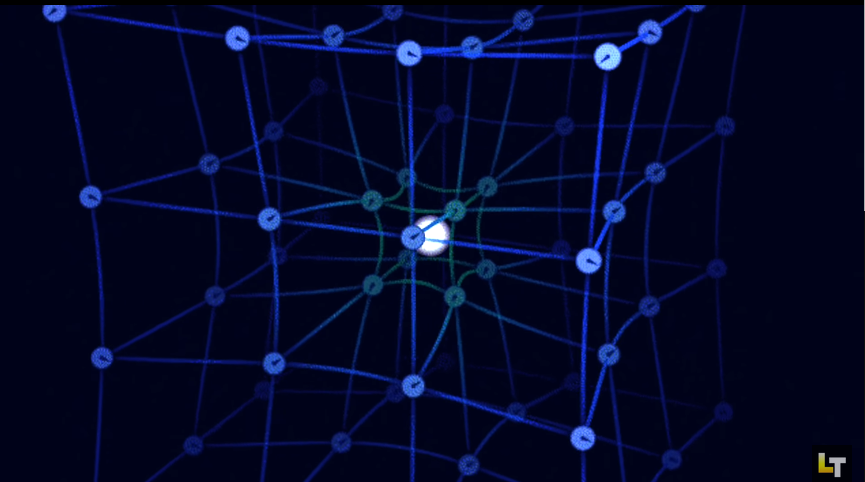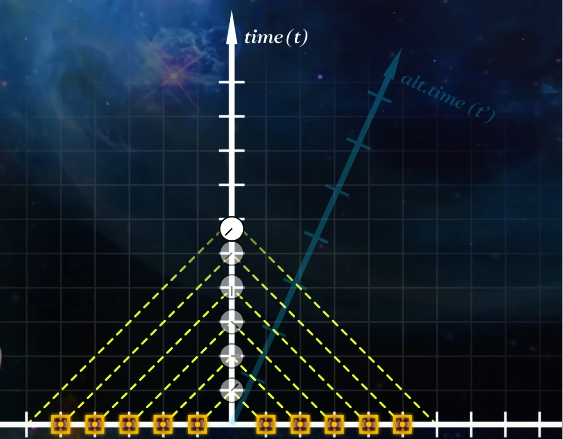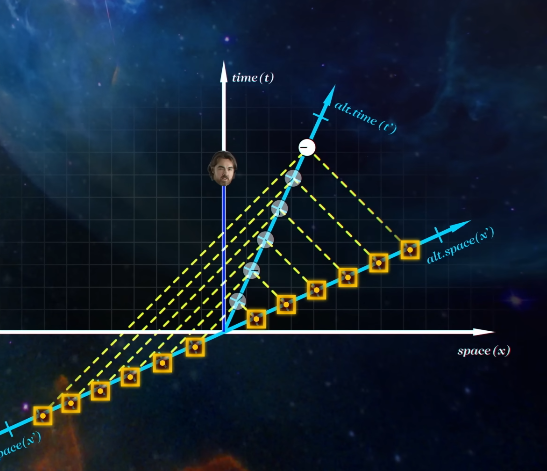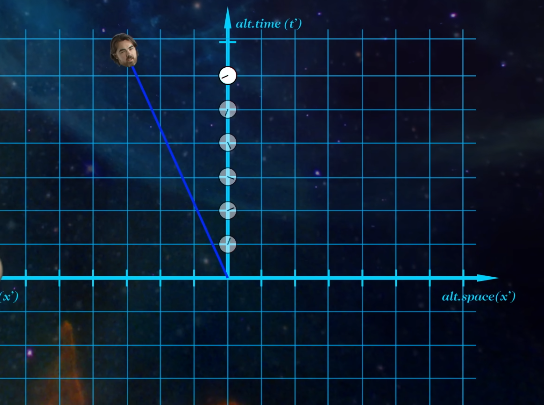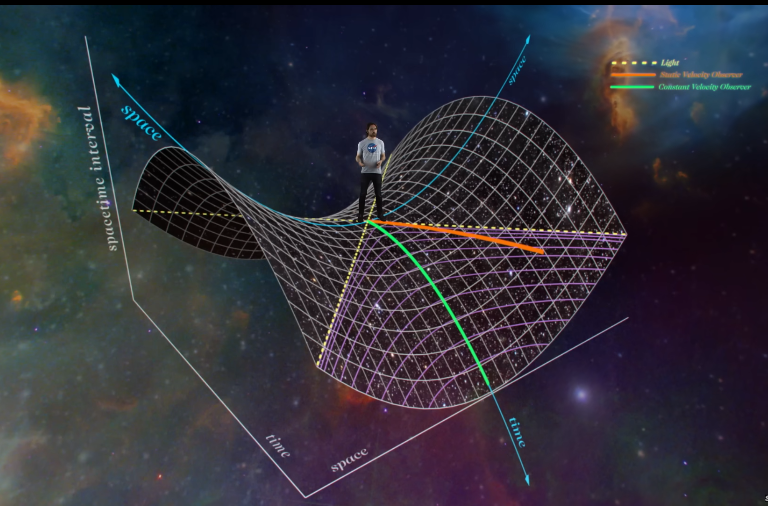As we delve into Dimension 0, we as a group will be experiencing extreme mechanics of spacetime which may on the surface appear to be incoherent.
This write-up attempts to prepare a shared understanding of time and its mechanics as they apply to the Unbound Machine's "dimensions". This will hopefully serve to clarify why things work the way they do, and prepare the players for a journey into a non-linear narrative without losing the coherent plot we feel engaged in.
Not everyone may be interested in the mechanics involved, so I have front-loaded this with the most relevant information to the game.
Imagine that you are standing far away from a black hole with your friend. Their character decides to start walking toward it. You start counting out loud together "one, two, three..."
As they get closer to the black hole, they hear you counting faster and faster from their perspective. You are both counting at the speed, but your friend is observing your future from their perspective.
From your perspective, your friend is moving slower and slower. As you move into the future, you are reacting to their past.
You both agree that when one of you reaches "1000", you will begin sprinting toward the other person, but never stop counting. Since you are standing still, you will reach "1000" first, while your friend is at "100" for example. Your friend hears you reach "1000" so they stop moving and wait for you to catch up.
From the perspective of your friend, your counting will slow down until you reach them. Regardless, you arrive with a count of "1555", while they have a count of "200".
You will both agree at which points in time you said the numbers, but you will have a different experience of time. For one person, 1555 counts have passed, while the other has only experienced 200 counts. The order of counts will be the same for both parties, but they will have experienced them at different rates.
To maintain causality, your body must be physically separated from the world during travel for the length of time you intend to travel.
By separating yourself from the present moment, you create a gap in time where you can travel backward without paradox. If you spend 24 hours in the time machine, then you travel 24 hours backward in time without issue.
By extending the analogy to a multi-dimensional universe, there may exist a hundred iterations of yourself. If you travel to a timeline where you are already separated from the present, then you can effectively swap timelines with another iteration of yourself temporarily.
The validity and risk of this depends entirely on how coherent your timelines are to each other. It is entirely possible to end up on an incoherent timeline if you are not careful with this method of travel.
The sense of forward Cause and Effect which we are familiar with. One event precedes another as its cause, with a logically consistent chain of events leading into the past.
Multiple causes can lead to one effect, coupled with conditions that enable it. One cause may lead to multiple effects and you can have feedback where an effect gives rise to new causes and effects, including back to the cause which gave rise to it originally.
Despite our perceptions, "one cause -> one effect" is too basic to apply to reality. Most cause and effect situations are so complex your main priority is to determine which cause is the decisive part in a whole set of circumstances.
You can spin a cause and effect situation out to the Nth degree, but what we're mostly concerned with is the most important causal link in any context.
In causality in our physical experience we generally consider both time and causation as a singular direction. You cannot take an action which will cause an effect in what we see as the past, which is now permanently behind us in time.
A glass is pushed off a table, it smashes. The cause has already occurred and obeys the second law of thermodynamics - Entropy.
Another example, you are caught in a time-travel loop. If you give an essential item to your past self, then in the future you will have to again give that same item to your past self. During this loop, the item is still constantly moving forward through time from its own perspective. That is to say, the item should age.
If that were true, then the item will continually degrade until its Entropy is maximized, meaning the object can no longer be part of the loop. This breaks down the timeline and prevents it from ever existing in the first place.
Entropy Paradox:
We can then understand that the flow of Entropy, or the direction it takes, is what we consider to be causality. This normally flows Forwards.
In this sense, basic causation travels "forward" in our frame of reference, with the arrow of time, or Entropy, pointing toward the future.
For our own purposes, all we need to be thinking about is what the existence of backward causation can mean. How it works is a topic that can be explored in more depth later on.
It is important to note the philosophical concept of backward causation should not be confused with backward causation that occurs through the process of time travel.
These two concepts are only related in the sense that they both agree it is possible, through a process of cause and effect, to affect the past.
The difference between the two is that time travel involves a Causal Loop. Backward causation without time travel would involve an actual reversal of time or the direction the arrow of entropy is pointing in.
Paradoxes -> The mere act of influencing the past through time-travel is itself a paradox. These come in many names, and you may be familiar with some like the contradictory Grandfather Paradox, the lack of free will in a Pre-destination Paradox, and the information loop of a Bootstrap Paradox.
Entropy Paradox: See the section on causality above.
Bootstrap Paradox:
Time-Loops -> To resolve most paradoxes, a time-loop is often required, but it is the death sentence of a narrative because it creates infinite paradoxes.
Conclusion: A paradox has a logically unacceptable conclusion, which takes something interesting or dramatic and makes it a pointless waste of time. Used incorrectly, time travel undermines the logic of key events, damages the foundations of a story, and serves only to be a short-cut which annoys anyone involved.
Forced Separation -> Isolating your present self away from the world for a set period allows time travel back to the point where isolation began to uphold causality. This works as long as you don't fall into traps seen in the movie Primer (2004).
By separating yourself, you create 3 versions of yourself. The original version, which will enter the time machine. The fate of the original version is to cease existing upon entering the time machine.
The second version of yourself is the one in the time machine, which is destined to become your double.
The third version of yourself is the double, who will exist at the same time as you and will continue into the future, while your original goes into the time machine.
Your double and original can not interact, or the paradox is re-established.
Growing Block View ->The growing block view of time holds that the past and present are real whilst the future is unreal; as future events become present and real, they are added on to the growing block of reality.
Presentist View -> Presentism, as a metaphysical thesis about time, is the view that only what is present exists.
Eternalist View -> According to eternalism, non-present objects like Socrates and future Martian outposts exist now, even though they are not currently present.
In order for time travel to work, we must accept an Eternalist view of time, as without it, there can be nothing traveling from the future, nor anything in the past to travel to.
This brings us to the Ex Nihilo Paradox.
Ex Nihilo -> From nothing.
- If time travel to the past is possible, backwards causation is possible.
- If backwards causation is possible, time loops are possible.
- If time loops are possible, uncaused events inside the loops are possible.
- Uncaused events are logically impossible
- Backwards time travel must be impossible.
We tend to apply our sense of observing time to the entire universe, because this makes sense to us. This causes a significant problem: our sense of the present is meaningless on a galactic scale.
The "present time" only works within the small bubble we as humans have imagined for ourselves around our planet, Earth.
Our concept of the present is based around our observable world. We see actions and events occur and this is what we consider to be the present, but how would you define more specifically what the present is?
- Is it a vague period of time? How long?
- Is it the speed our brains are able to process conscious thought?
- Does it require a mechanical action, external stimulus?
- If my idea of time is different than yours, whose is correct? Is one person's measurement of time more correct than another?
This might sound absurd, and pointless, because if you think about it the idea of present is extremely difficult to define. By the time you think about it, it's already in the "past".
How would we choose to measure the present if we could? The more we try to consider it, the more philosophical it becomes. But this idea of the present exists without the world regardless, and it's something we engage in naturally. This works as long as we stay within the bubble of our planet, where we live, but once we travel outside of this space we find that our sense of present begins to fall apart.
Thus, it may be tempting to perceive the present as the edge of a wave which travels into the future.
For our purposes, it is better off to think of the present as not a thing at all. Instead, every moment is more like a coordinate in a Space-Time grid block in our universe. Your position in this grid, and thus your frame of reference, affects your perception of the order of events.
We only feel this idea of "present" because of how we function, how we perceive Entropy.
Even standing a mile away from someone, waving at them, it will still have taken a miniscule amount of time for the light to travel to your eyes and be processed. To wave back may seem like a shared present timeline, but at that moment you are both technically looking into the past, not the present. Thus you have different points of reference, even though they are only separated by mere miliseconds.
The further you get from the thing you are interacting with, the further separated you are in time, and thus your perceptions begin to diverge rapidly.
Imagine you are getting closer to a black hole as a thought experiment. Your sense of time becomes increasingly bent as you approach it, compared to somebody far away. Your perceptions of time are now very different. Your clocks will not run the same. As you wave to them, waving back will now become a difficult experience. You may wave, and they may wave back at a far later point in time from your perspective.
It may be tempting to think of time as a way to see causality. In actuality, it's causality which is responsible for allowing us to see what we observe as time. Having a finite speed on causality (light) is essential for our universe to work. We observe time by observing this rate of causality, and are constrained within it.
We can see it is clear that we assume our own perception of time is our perception of causality. One may then be led to assume that even though you perceive time running at different speeds at different points in space, there is still a universal speed everything obeys.
This is true, but there is a nuance which breaks our assumed perception. Whether you are far away from the black hole or close to it, light speed is still the same from your frame of reference, meaning the perception of causality is different depending on your frame of reference.
Let us define two observers. The second observer is traveling at close to half the speed of light compared to the first observer.
If we define a series of simultaneous events, the yellow squares, then as we move forward through time, we see these simultaneous events reach us, with the yellow lines representing the time it takes the light to arrive at the first observer.
If the second observer also defines a set of simultaneous events to measure time, then from the perspective of the first observer, we will see the observer reacting to events which are not simultaneous form our own perspective of time.
**From the perspective of the first observer, the clock of the second observer appears to be reacting to events originating from different points in time.
In the above picture, the teal lines of the second observer are extending out into a 3rd dimension. We can correct the picture to be from their own perspective with a simple rotation.
If we then consider the perspective of the second observer, to them, these events were simultaneous. Their perception of causality defines their timeline.
From this, we gather the following:
The movement through space and the change in time of an event at the end-point of a traveler's timeline might change depending on who is watching. But ultimately, both observers will agree on the order of events.
To visualize this, focus on the purple lines in this graph between the two observers. An event early in the green observer's past will happen far in the red observer's future, and vice-versa. By the time the red observer's future occurs, they will be seeing the green observer's past. They will both agree on the final order of events, even though these events happen at different times from their own perspectives.
We experience time Linearly with there being one "true" order of events at least from our perspective. We operate mostly on the first diagram, a wave of the "present" flowing into the future.
To experience time Non-Linearly is, essentially, the same as living outside of time itself. The direction or flow of time itself has no effect on you and your perceptions would be vastly different than those of somebody experiencing time linearly from within a timeline.
Does this mean that those who exist outside of Linear time then rise above this perception of the "present" and view reality like the block-diagram where all events exist as points, rather than a continuous wave of present passing into the future?
The answer is grey, but ultimately is "not necessarily".
By considering a being in a higher dimension, say a 5th or 6th dimension beyond our own 4D space-time, would go a ways to explaining the behavior of a non-linear being.
Our universe need not exist within a strictly Eternalist interpretation of time. The future may be indeed continuously forming, but our perception of events may be influenced by things far older than our perception. If, for example, this higher dimensional being can arbitrarily alter its frame of reference, then it would only be constrained to any possible timeline.
To visualize this: Reference the last graph above, the "purple line" represents a slice of all the points this non-linear being could exist on simultaneously.
Borrowing our black hole analogy from earlier, this entity could choose to simultaneously exist very far from and very close to our own timeline. We would experience a past and future version of it from our perspective interacting with us, but it will never come from our future. Only its own future and past. In this sense, the future is not entirely fixed for either us or the non-linear entity.
So then if you consider the God Machine to be a higher dimensional entity, it may exist both as a primordial construct and a highly advanced version of itself simultaneously in our own timeline. Much like our friends in the black hole analogy, if you consider both of the friends to be the God Machine, then they are experiencing two different timelines simultaneously but ultimately they both agree on the order of events in the overall "machine".
